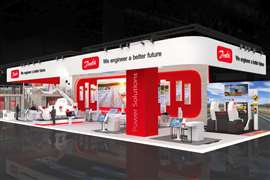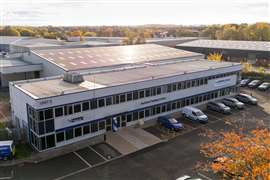Volvo, Westport JV to accelerate adoption of HPDI technology
20 July 2023
 While Volvo will be a key customer, the joint venture’s mandate will be to enhance commercialization of HPDI through new trucking and equipment manufacturers. (Photo: Westport Fuel Systems)
While Volvo will be a key customer, the joint venture’s mandate will be to enhance commercialization of HPDI through new trucking and equipment manufacturers. (Photo: Westport Fuel Systems)
Volvo Group and Westport Fuel Systems Inc. have signed a non-binding letter of intent to establish a joint venture to accelerate the commercialization and global adoption of Westport’s HPDI fuel system technology for long-haul and off-road applications. The companies cited a shared vision to create sustainable transport solutions that can accelerate decarbonization efforts of trucking, engine and equipment manufacturers.
Westport’s HPDI (High Pressure Direct Injection) fuel system is a complete system offering OEMs the flexibility to differentiate biogas, natural gas, hydrogen, and other fuel product lines, while also maintaining maximum commonality with their conventional diesel-fueled products, the company said. The intent is to enable trucking and off-road equipment manufacturers to address the challenges of meeting the regulatory requirements of Euro 7 and the U.S. EPA while offering carbon-neutral options to end users.
The HPDI fuel system consists of a fully integrated “tank to tip” solution based on diesel technology. A patented injector with a dual concentric needle design injects a small amount of pilot fuel (diesel fuel or a biodiesel renewable fuel) into the cylinder, prior to the gas, to initiate ignition.
For its part in the joint venture, Westport will contribute current HPDI assets and activities including related fixed assets, intellectual property and business. Volvo will acquire a 45% interest in the joint venture for the sum of approximately US$28 million (approximately SEK 300 million) plus up to an additional US$45 million (approximately SEK 500 million), depending on the performance of the joint venture. While Volvo will be a key customer, the joint venture’s mandate will be to enhance commercialization of HPDI through the addition of new trucking and equipment manufacturers as customers.
Volvo’s ambition is to reach net-zero greenhouse gas emission-enabled products, solutions and services by 2040, and the company advocates for a three-pronged approach: battery-electric, fuel-cell electric and internal combustion engines.
“Decarbonization with internal combustion engines running on renewable fuels, especially with HPDI, plays an important part in sustainable solutions. HPDI has been on the road in Volvo trucks for over five years and is a proven technology that allows customers to significantly reduce CO2 emissions in LBG (Liquefied Biogas) applications here and now and is a potential avenue for hydrogen,” said Lars Stenqvist, chief technology officer of Volvo.
David Johnson, CEO, Westport, said his company is advancing fuel system solutions that can help its customers affordably address the challenges of decarbonization while continuing to use existing manufacturing infrastructure.
“The joint venture with Volvo is a natural extension of both companies’ commitment to accelerating global carbon reduction and we are proud to partner with such a bold supporter of the future of the internal combustion engine,” he stated. “Combining our expertise strengthens HPDI’s position in the market and underscores Westport’s commitment to developing affordable fuel system technology that supports significant CO2 reductions in hard to abate sectors like heavy-duty transport and off-road applications, including a pathway to power equipment with zero carbon fuels like hydrogen.”
Completion of the joint venture is conditional on successful negotiations and execution of a definitive investment agreement, joint venture agreement, supply agreement and development agreement. The joint venture is expected to launch in the first half of 2024.
POWER SOURCING GUIDE
The trusted reference and buyer’s guide for 83 years
The original “desktop search engine,” guiding nearly 10,000 users in more than 90 countries it is the primary reference for specifications and details on all the components that go into engine systems.
Visit Now
STAY CONNECTED




Receive the information you need when you need it through our world-leading magazines, newsletters and daily briefings.
CONNECT WITH THE TEAM














